Have you ever skipped a medical appointment because you couldn’t face getting a shot or having blood drawn? Or maybe you’ve felt dizzy, panicked, or frozen with fear at the very thought of needles?
If so, you’re not alone…
For some people, this is more than just discomfort—it is an extreme fear that can interfere with their health and everyday life. At Silicon Valley Hypnosis Center, we can help you overcome your fear of needles with effective treatment options.
Read on to understand this fear, its causes, symptoms, and how to overcome it.
What is Trypanophobia?
Trypanophobia is classified as a specific phobia and falls under the broader category of blood-injection-injury (BII) phobias.
Many factors can trigger this phobia such as a painful or forced injection as a child.
Over time, the brain associates fear with anything involving needles in a medical setting, thus developing the phobia. People with a fear of needles put their health at risk by missing medical treatments involving:
- Vaccines
- Blood tests
- Treatments for chronic health conditions
They may also squirm and shout during an injection, increasing the risk of an injury.
The Most Common Symptoms of Trypanophobia
The symptoms of trypanophobia can vary from mild discomfort to severe anxiety and panic attacks. If you or someone you know has a phobia of needles, these symptoms might sound familiar:
- Physical symptoms: Sweating, trembling, rapid heartbeat, nausea, dizziness, or fainting (a unique physiological response called vasovagal syncope, where there is a sudden drop in blood pressure).
- Intense fear responses: Feeling paralyzed or frozen at the sight of needles.
- Severe symptoms: Avoiding medical procedures altogether due to symptoms, even at the expense of personal health.
- Emotional distress: Overwhelming feelings of dread, anxiety, or panic when thinking about shots, injections, or blood draws. For some people, just watching someone take a shot can even trigger symptoms.
These symptoms can make simple medical visits feel like a nightmare.
Causes of Trypanophobia
Like many phobias, trypanophobia often has deep roots, and can be shaped by a combination of your personal experiences, psychological factors, and even genetics.
Let’s explore the major causes:
Psychological and Emotional Factors
Many people with needle fear report a negative experience involving needles during childhood.
For example, a child may have experienced extreme pain during a vaccination or blood test, leaving them with lasting fear. Others may develop anxiety around needles because of stories or witnessing someone else’s reaction to injections.
- Past negative experiences: A painful or traumatic needle experience during childhood can create a long-term fear response.
- Vicarious learning: Observing a family member, sibling, or peer display intense fear of needles can teach the brain to associate needles with danger or discomfort.
- Anxiety disorders: People with generalized anxiety or social anxiety disorder are more likely to develop specific phobias like trypanophobia.
Genetic predisposition
Research suggests that some people may have a genetic predisposition to phobias.
If a close family member struggles with a fear of doctors, needles, or blood, there’s a higher likelihood that others in the family may share similar fears.
Genetics influence how our brain processes fear, leading to a risk of developing specific phobias.
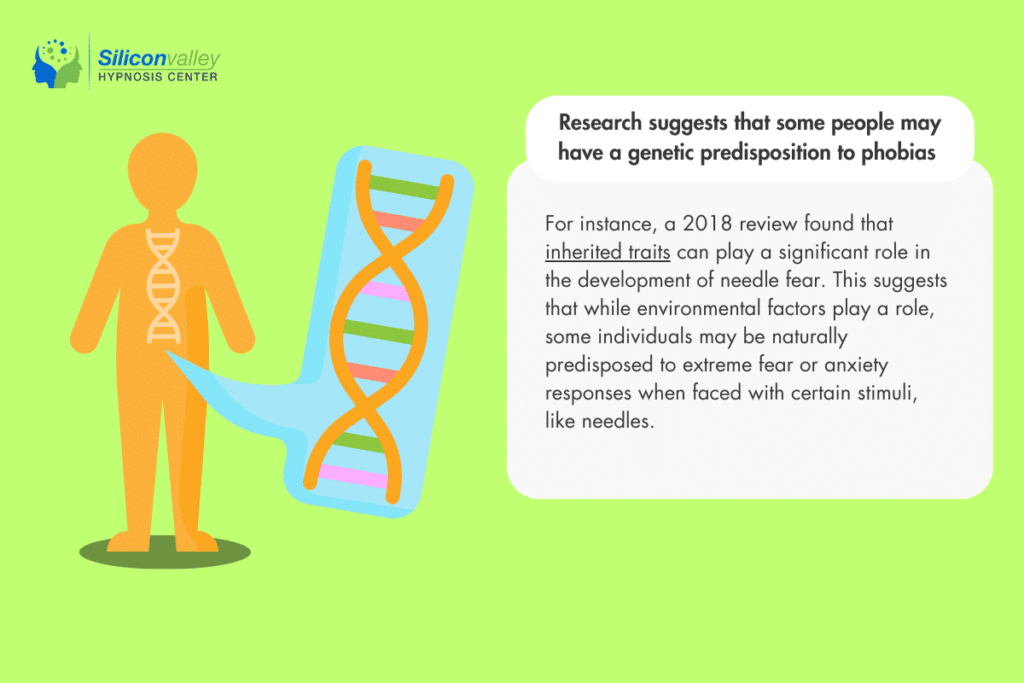
For instance, a 2018 review found that inherited traits can play a significant role in the development of needle fear. This suggests that while environmental factors play a role, some individuals may be naturally predisposed to extreme fear or anxiety responses when faced with certain stimuli, like needles.
Hypersensitivity to Pain
Some individuals experience pain more intensely than others due to hypersensitivity. For these people, even minor pricks from a needle can feel exaggerated, increasing their fear and anxiety.
Who Is At Risk?
While trypanophobia can affect anyone, certain groups are more prone to developing this phobia of needles:
- Children and Adolescents: Young children may develop needle phobia if they have repeated negative experiences or lack support during medical visits. For instance, a child who screams during a vaccination and isn’t comforted by parents or medical staff may associate needles with fear and pain.
- Individuals with Anxiety Disorders: People with a history of anxiety, including generalized anxiety disorder or social anxiety disorder, may have an increased risk of developing trypanophobia.
- Individuals with Traumatic Pasts: A previous traumatic event, such as a painful injection or medical emergency, can trigger severe anxiety around needles. Other non-needle traumas can be triggered as well.
- individuals with other fears related to medicine or illness, such as mysophobia.
The Impact of Trypanophobia on health
The effects of this phobia go beyond fear. Avoiding medical care can have serious consequences, such as:
- Avoidance of Medical Procedures: People may skip essential vaccinations, blood tests, or treatments for chronic health conditions.
- Impact on Overall Health: Delaying or avoiding medical care can worsen existing conditions or lead to undiagnosed health problems.
- Quality of Life: Living with constant fear and anxiety about medical visits can interfere with one’s daily life and mental health.
In extreme cases, the fear of needles can even result in avoidance of life-saving treatments, like chemotherapy or intravenous medications. This avoidance behavior makes it critical for individuals to overcome trypanophobia…
…and ensure they receive timely and necessary medical support.
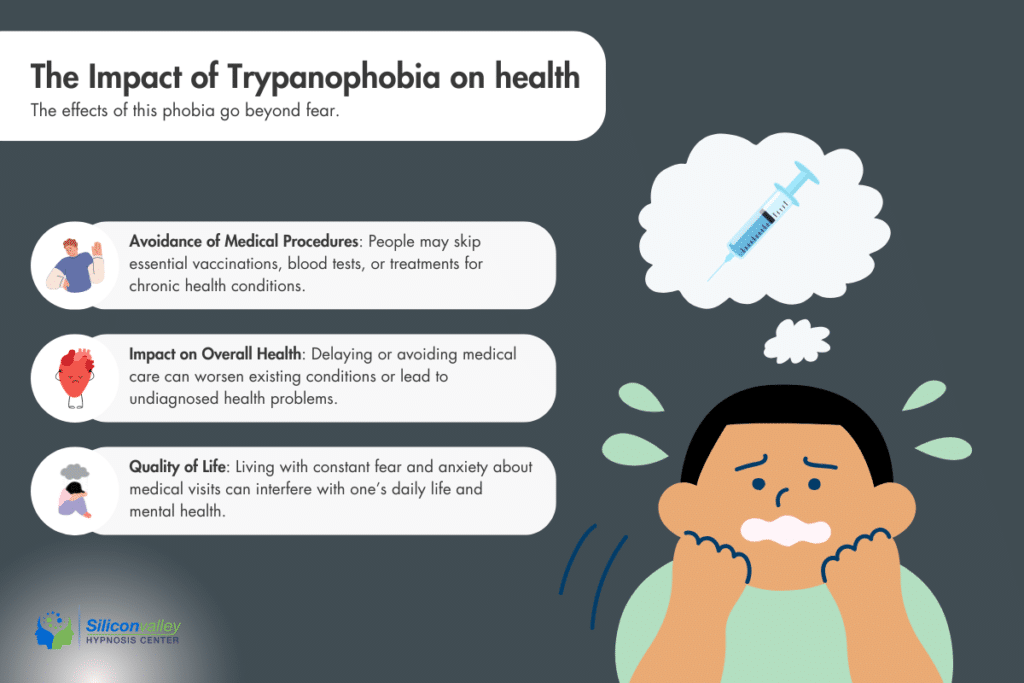
Treatment Options for Trypanophobia
The good news is that trypanophobia is treatable. Several effective treatment options can help you manage and even overcome your fear of needles:
1. Cognitive Behavioral Therapy (CBT)
CBT is a popular treatment for phobias. This form of behavioral therapy helps you identify and challenge your negative thought patterns about needles. Over time, CBT reduces the fear response and helps you develop healthier coping mechanisms.
2. Exposure Therapy
Exposure therapy involves gradually exposing a person to their fear in a safe and controlled environment. For example, you might start by looking at pictures of needles, then watching videos of injections, and eventually holding a needle. This step-by-step approach helps reduce the intensity of your fear responses.
3. Medication Options
In some cases, medications such as anti-anxiety drugs can help manage symptoms of anxiety related to needles. While medication isn’t a long-term solution, it can help in situations where immediate medical care is necessary.
4. Hypnotherapy
Hypnotherapy enables changes to happen at the subconscious level, where the fear resides.It can be a bit like rewiring the mind away from having the fear.
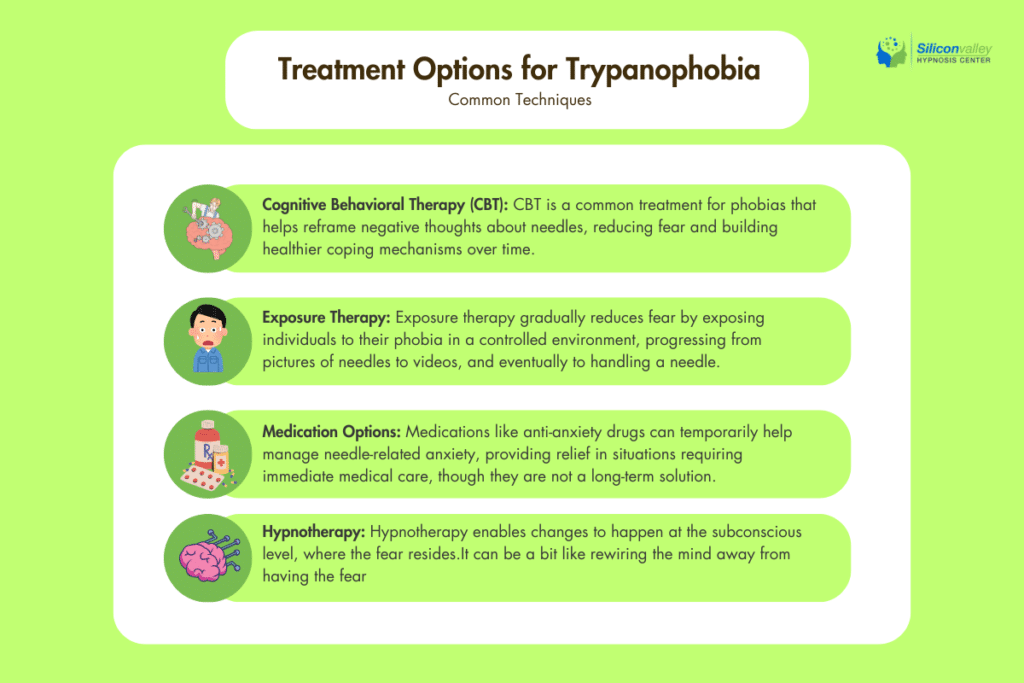
Personalized Hypnotherapy for Needle Phobia
Hypnotherapy is a powerful tool for addressing the underlying causes of needle phobia. Unlike other therapies, hypnotherapy works directly with the subconscious mind to reframe the negative associations with needles.
It can create lasting change by targeting the root causes—whether they stem from past trauma, fear of pain, or learned behavior.
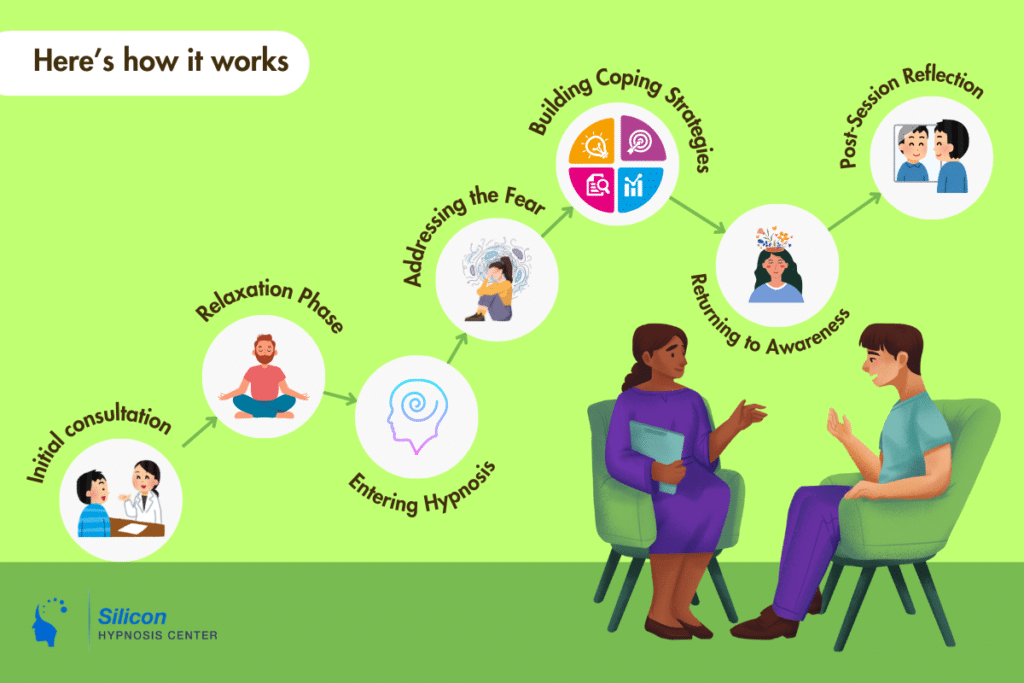
Here’s How It Works
Curious about how hypnotherapy can help with your fear of needles?
Here’s a step-by-step breakdown of what a typical session at Silicon Valley Hypnosis Center might look like:
- Initial Consultation: Your hypnotherapist will start by talking with you about your fear of needles, your past experiences, and any triggers. This helps us understand your unique situation and set goals for the session.
- Relaxation Phase: At the start of your hypnotherapy session, you’ll be guided to a comfortable position, usually sitting or reclining. I will use calming words, gentle instructions, and breathing techniques to help you relax both your mind and body.
- Entering Hypnosis: I will guide you into a deep state of focused relaxation. You’ll feel calm and peaceful, like being in a daydream, while still fully aware of your surroundings.
- Addressing the Fear: While in this relaxed state, I will use techniques like guided imagery or positive suggestions to help you change how you think about needles. For example, they may help you picture getting an injection without fear or stress, replacing the anxiety with a sense of calm and control.
- Building Coping Strategies: I may introduce mental cues, affirmations, or relaxation techniques that you can use whenever you encounter needles, empowering you to remain calm and in control. This serves as additional methods to cope with real-world situations.
- Returning to Awareness: Once the session is complete, I will guide you back to a normal state of awareness. You’ll likely feel refreshed, relaxed, and more optimistic about your ability to face needles without fear.
- Post-Session Reflection: After the session, you and I may discuss your experience and any changes you noticed. Multiple sessions might be recommended depending on the severity of your fear, but many people report significant improvements after just one.
Scientific Evidence Supporting Hypnotherapy for Phobias
Hypnotherapy has been shown in several studies to be an effective treatment for phobias, including the fear of injections.
Research has found that hypnosis can help individuals access the subconscious mind, where fears are often rooted. Hypnosis reprograms how the brain responds to certain triggers, such as the sight of a needle, helping to reduce the persistent fear attached to these situations.
- A 2019 study found that hypnosis can significantly lower anxiety and improve the ability to cope with phobias.
- Another study indicated that hypnosis helped patients with needle phobias experience less pain and anxiety during medical procedures.
This scientific study suggests that hypnotherapy is a valid and useful tool for overcoming fears like trypanophobia.
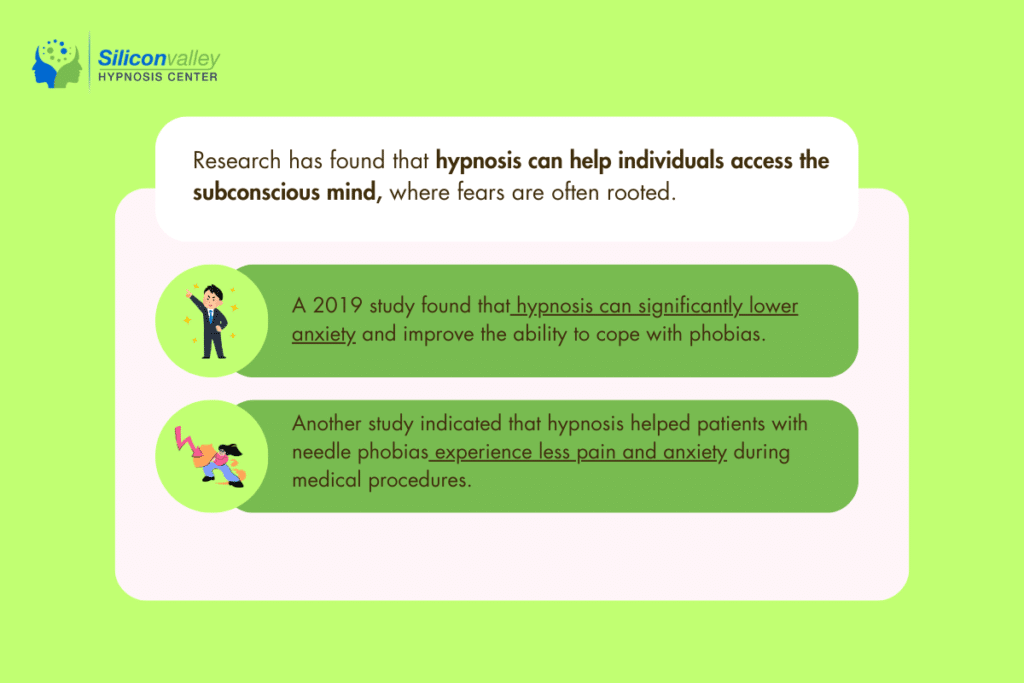
Coping Techniques for Managing Fear
Overcoming trypanophobia isn’t just about eliminating the fear but also about learning how to manage it when it arises. Here are some practical coping techniques that can help you:
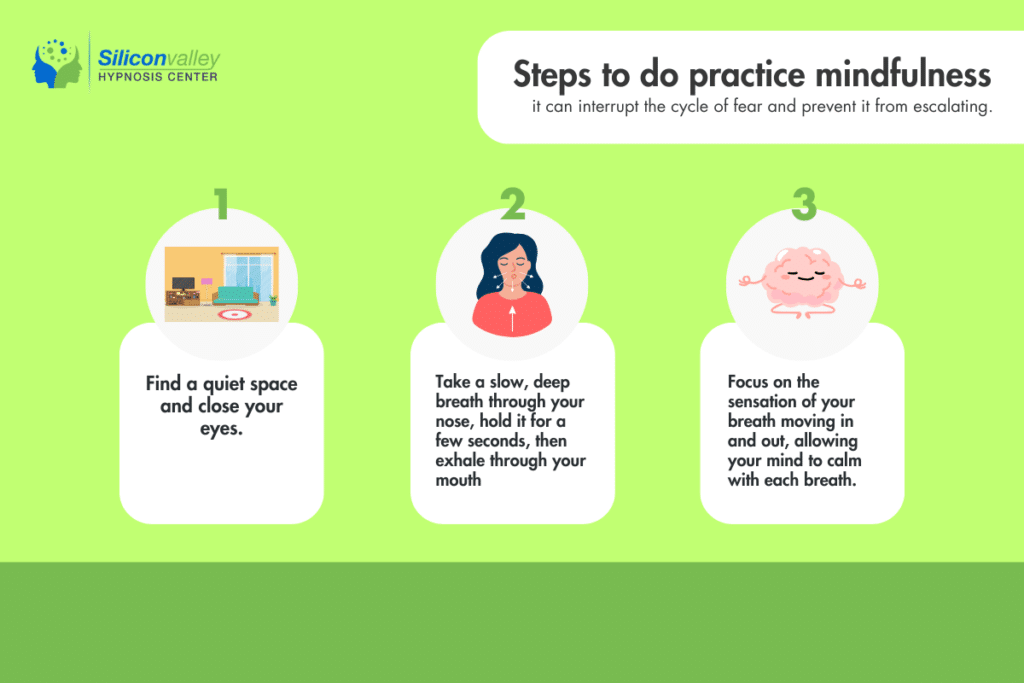
Mindfulness involves staying present in the moment and focusing on your breath, which can be incredibly helpful in reducing anxiety. Practicing mindfulness can interrupt the cycle of fear and prevent it from escalating. Deep breathing exercises can also help calm your body’s natural “fight-or-flight” response, making it easier to face situations involving needles with a calm mindset.
Try these simple steps:
- Find a quiet space and close your eyes.
- Take a slow, deep breath through your nose, hold it for a few seconds, then exhale through your mouth.
- Focus on the sensation of your breath moving in and out, allowing your mind to calm with each breath.
Utilizing Supportive Strategies with Healthcare Providers
When facing a medical procedure that involves needles, it’s important to communicate your fear to your healthcare provider. Many doctors and nurses are trained to work with patients who have phobias and can offer supportive strategies, such as:
- Using a numbing cream or local anesthetic to make the injection more comfortable
- Allowing you to lie down or sit in a relaxed position to reduce anxiety
- Providing reassurance and encouragement before and during the procedure
Self-Hypnosis Techniques
Self-hypnosis allows you to enter a relaxed state on your own, so you can apply calming techniques when faced with needles.
Start by finding a quiet space where you won’t be interrupted.
Self-hypnosis uses positive affirmations and imagery to relax your body and mind before facing any medical procedures. Your hypnotherapist will provide you with self-hypnosis tools. With practice, you’ll become more adept at calming yourself down during situations that would otherwise trigger your fear.
Conquer the Fear of Needles with Hypnotherapy
Overcoming trypanophobia is possible with the right tools and techniques. Hypnotherapy is a proven method that has helped many people break free from their fear of needles.
At Silicon Valley, we have helped many people with needle phobia overcome their fear, and quality of life. If you or someone you know is struggling with this phobia, consider taking the first step toward a more peaceful, fear-free life.
If you’re ready to conquer your fear, sign up for a free consultation today and learn how hypnotherapy can help you overcome trypanophobia for good!